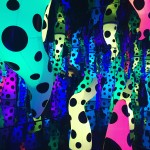Yunong Wang
Toyota Technological Institute
Material Science
Status: B3 Expected Graduation: March 2018
Research Host Lab: Li Lab, Civil & Environmental Engineering, Rice University![]()
Research Project Poster: “Capacitive Deionization Using Activated Carbon Super Capacitor for Water Desalination”
Why Nakatani RIES?
I see my internship at Rice University as an important step in my personal and professional development. In my future I want to work as an engineer, so after receiving my bachelor’s degree, I would like to apply for a Master’s Degree in the U.S. However, while this is my main professional goal, I have several other academic and personal goals as well. Good engineers should work not just with their computers, but also should have more chances to talk with their colleagues, people working in the factory, and the customers. They also need good ability of making presentations to introduce and explain their ideas and products to others. Unfortunately, Japanese students are weak in this point. Furthermore, I don’t have many chances to cooperate with American students in Japan, so I hope that besides improving my English abilities, through this internship I will be able to learn more about the culture and the sense of values in the U.S. Therefore, “achieving skills necessary for successful communication” is an important goal for me, both during my present studies, and especially during my internship at Rice University.
One more important personal goal for me is to become a person who will change the academic and working environment for women scientists in Japan. In Japan the professional environment is not good for females. There are many women who lose their jobs after having their children, and there are fewer chances for women to get promotion in Japanese companies. The change will surely not be easy, but I believe it’s our responsibility to bring it. I want to learn about the environment in the U.S. so that I will have a clear vision for the change. Through participation in this internship I hope to learn more about the academic and professional environment in the American society.
Goals for the Summer
- Making friends from different studying fields and culture backgrounds.
- Learning more about the academic and professional enviroment in the American society.
- Achieving skills necessary for successful communication.
Excerpts from Yunong’s Weekly Reports
- Week 01: Arrival in the U.S.
- Week 02: First Week in My Research Lab at Rice
- Week 03: Interview with a U.S. Researcher
- Week 04: Reflections on English Language & Life in the U.S.
- Week 05: Research in the U.S. vs. Research in Japan
- Week 06: Final Week at Rice & Research Poster Presentation
- Week 07: Visit to Washington, DC & New York City
- Final Report: Reflections on the Nakatani RIES Fellowship
Week 01: Arrival in the U.S.
After arriving at Sanuki Club Hotel, I was very tired because of the long trip from Nagoya to Tokyo. My lucky summer internship started from this day, August 7th. I couldn’t believe I was selected to be one of the Japanese fellows until I met all of the other members at the hotel. I will spend my summer with 7 strangers. The only information we knew about each other before we met was from the Nakatani RIES fellows’ profiles on the website. I was so excited to meet new friends and also nervous to participate my first research internship in a totally different environment. Japanese Fellows include 5 seniors, 2 juniors and 1 sophomore student. Except for me and another sophomore student, all other students have prior research experience. I thought that everyone looked smarter than me.
However, after meeting the U.S. Fellows, I was totally motivated. Most of the U.S. Fellows are freshman and sophomore students. When I asked them, how they survived for the three months without any prior research experience, all of them gave me the same answer. “You will be fine. You just go there and you will know what to do.” There is nothing to be afraid of. I love how American people think this way. In Japan we usually start our laboratory experience when we become senior students. On the other hand American students can apply for a research internship whenever they want; even as a freshman. In my personal opinion, this is a difference between Japanese and American culture.
Japan has a collectivist culture. People are dedicated to maintaining the harmony of the group. There is a special world in Japanese “Wa” which represent this core idea of Japanese culture. Most of time, personal ability and individuality can see as a potential harm. Japanese students are afraid of ruining the harmony. That’s why students don’t ask questions during the class. They don’t want to break the silence. However, this can be a big disadvantage for when challenged by new things. Without asking questions we can’t learn new things. America has a very strong individualist culture which values personal achievement and competition. American students are eager to be challenged new things. They are not afraid of taking charge and speaking out what they want. In research, it is important to know what you want to achieve all the time and be eager to reach those goals. At the joint session in Tokyo, Japanese fellows and American fellows are both agreed with this point. We also learned this point during Sarah’s talks.
The biggest difference I found between Japanese and American culture is the value about time. In America, time is money. Done is better than perfect. In Japan, we are tend to focus on one thing and try to make it perfect. It’s hard to say which the best way to approach problems is, but the American way looks more challenging for me. In generally, students need 6 to 7 years to achieve their PH.D degree. Spending such a long time to elucidate some problem which they may not be solved at the end needs endless curiosity and patience. We should take the advantage from both Japanese and American culture.
During our first weekend in the US, we went to NASA with the U.S. Fellows. I was surprised many of American students haven’t been there as well. The most impressive part is visiting the Christopher C. Kraft, Jr. Mission Control Center. I saw the radio that received the first voice from moon.
Question of the Week
I rarely see people use umbrella in the campus. Is not common to use umbrella in here?
How did you prepare to for your research internship at Rice before you left Japan?
My host lab was determined at the beginning of July. Since I didn’t have any prior research experience, it took me very long time to find the laboratory thatI was mote interested in. Once it was determined that I would work in the Li Lab, I sent an e-mail to my host professor and discussed the project that would work on during my stay at Rice. I told her my specific interests in her research and asked for her advice. Depending on my interest, she was so kind to give me 4 choices of different projects:
- Control of biological fouling using environmental friendly approaches;
- Novel carbon nano materials for desalination using capacitive deionization
- Photothermal membrane materials for direct solar membrane distillation
- Control of scaling/fouling in membrane distillation system.
My major in my home university is material science. I see this internship as an opportunity to decide the direction of my future research. Because of this, I ended up choosing the 2nd project. I didn’t have any background knowledge about this topic, so I asked my mentor what I should learn before I went to America. My mentor was also very nice to send me two papers to read.
Week 02: First Week in My Research Lab at Rice
I met my host professor on the morning of the first day with another exchange student from China. My host, Professor Qilin Li, is originally from China. She is very happy to know that I have a similar cultural background with her. She is part of the leadership of the Nanosystems Engineering Research Center for Nanotechnology-Enabled Water Treatment (NEWT) at Rice University. Before the first day, I went to her office to confirm the place. Professor Li’s office is in the Mechanical Laboratory. It is one of the oldest buildings in Rice University. I saw her wearing a floral design dress and high heels. I was shocked. In my home university, we don’t have any female professors in the engineering department. Before I met Professor Li, I thought she should be very strict and serious. Actually she is very kind and feminine. In Japan, we usually have some stereotypes against female scientist, but it is not true at all.
My mentor didn’t know I was coming. I met him around noon. His name is Jun Kim. He is from South Korea. He was surprised about at my English pronunciation. He told me he was worrying about what if I have some strange accent. Basically, we don’t have any problem in our communication. Furthermore, we found something amazing! In Korean and Japanese, most of scientific words shares same pronunciation. For example, oxygen is Sanso in Japanese. It’s also Sanso in Korean. I was worried about my poor vocabulary in science. Now I can use Japanese! Jun told me, most of the scientific words in Korea came from Japan. Jun has just become a father of two children. Every time when I talk to him, he is always so peaceful and patient. Thanks to him, I feel it is easy to ask questions anytime.
Except for my mentor and other three American students, most of the members in our laboratory are from China. There are many Chinese visiting professors in Professor Li’s researching group. This is also good for me that I can practice my Chinese during lunch time. The Chinese lab members are very friendly. We only use English in the office. I feel very comfortable in my office.
During the first week at Rice we attended the SCI 2nd Annual Summer Research Colloquium. After watching all the U.S. Fellows poster presentations, I was very motivated. They all started their first research experience this summer in Japan. During their presentation, they were very confident and were able to explain their experience to the audience. I like the phrase ‘work hard and play harder’. I believe if I can work hard this summer and use the techniques we learned at poster presentation session, I will be able to make a great presentation too.
I was also impressed with the safety training session conducted by the Office of Environmental Health & Safety. I needed to take the general safety training. I also watched my mentor taking training for using the Scanning Electron Microscope (SEM). Rice University provides various training for students and researchers. Safety is the most important part in research life. There was one professor in my home university who asked me to tell him, how the safety training was conducted at Rice University. I will help him to make a better safety training system in my university.
Research Project Update
My research project is ‘selective ion removal of capacitive deionization (CDI) at different condition’. Since I’m still a junior student, my fundamental goal for this project will be to understand of basic CDI mechanism and quantifying methods of ion. The first week was the preparation week for me. My mentor explained the mechanism of the CDI to me many times. We also did the experimental set up and calibration. In our plan, the following two weeks we will use Inductively Coupled Plasma (ICP) and Ion Chromatography (IC) to measure the concentration of each ion (sodium and calcium) to evaluate the selectivity of current electrode. Depending on the results, we will do some supplementary experiments in the 4th week. We will use the last week to summarize the overall results.
The other more senior Japanese fellows have also helped me a lot. I am so glad I always can find someone to ask questions to. I had a difficult time understanding the connection between the zeta potential theory and my experiment. After I came back to hotel, I asked some senior students to explain the theory for me. The next day I asked my mentor again to make sure my understanding is correct. I believe the fastest way to learn in a short term is to ask questions as much as I can.
Week 03: Interview with a U.S. Researcher
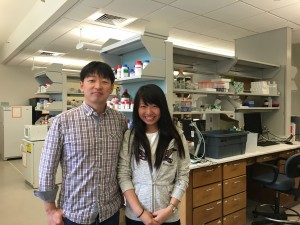
I really enjoyed my interview with two international students in my host lab. One is my mentor who is a PH.D student from South Korea. Another is a researcher in my lab who has just finished her PH.D degree at Rice.
Here at Rice University, there are over 700 Chinese students and 100 Korean students. There are only 11 Japanese students studying as degree-seeking students at Rice. Since I got the chance to interview some researchers, I wanted to know more about Chinese and Korean students.
Whether Chinese or Japanese students, they are all enthusiastic about their studies. Reaching for a Ph.D degree takes a very long time and during this period you will face many problems and difficulties. They could be caused by either personal or academic reasons. Studying in a whole other county can also be a big challenge for students. Why are Chinese and Korean students are willing to study abroad? It’s because of the cutthroat competition in their home counties. My mentor told me, even though you are working for a big company such as Samsung in South Korea, you could be fired when you become 40. They want more energetic and competitive workers. When you turn to 40 and lose your job how can you support your whole family? He was afraid of this reality in South Korea. That’s why he decided to quit his job and come to the U.S. and pursue his PH.D degree. He has just become a father of two kids.
Another female researcher in my lab is from China. She is a graduate from Beijing University. They are many Chinese students from Beijing University and Qinghua University. It should be very easy for them to get a job in China after their graduate. However, the working environment is more complicated than I thought. In China, the connection with people who are in charge of employment is very important. Same as Japan, companies in engineering and science field are unlikely to hire female researchers. On the other hand, universities in the U.S. are open doors to these talented Chinese students. That’s the reason she decided to come to America and to continue her studies at Rice. She has just finished her PH.D course this summer. She is now working as a researcher at our lab now.
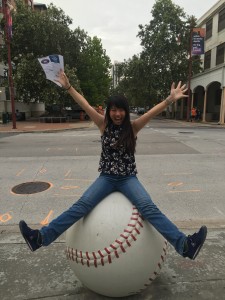
According to their stories, there are both advantages and disadvantages to doing research in America. The biggest advantage at Rice is that they can easily get access to publish papers in famous journals. My mentor sent a paper to one of the publishers in the U.S. when he was a master student in South Korea. It took nearly 1 year to publish one paper. In the U.S., he can easily get advice from the committee members and usually get access to the editors. Another advantage raised by them is they can cooperate with other researchers easily at here. There are many laboratories doing similar research here. Even though they don’t belong to same field, but they still are able to work for same project. Cooperating with other research groups is more efficient. By sharing each others knowledge, they can bring their research to the next level.
The biggest disadvantage is lack of equipment. There are many equipment belongs to Rice University. If you want to use then you have to take the training first. You have to use many times to wait. Universities in China, South Korea and Japan have much better faculties than here.
Most of the Chinese researchers here didn’t have very much international experience before they came to Rice. That is also a major reason for them to pursue a degree in the U.S. They see studying aboard as a very important experience in their academic lives. Those students used to be at the top level university in China, after they came to America; they realized there are many more talented people in the world. Doing research with many talented people at a competitive environment needs energy and endless effort. They are willing to take the challenge when they are young.
My mentor had many international experiences before he came to the U.S. He went to Indonesia when he was an undergraduate student to do a volunteer work. After working, he had been to India and Spain as business trips. Those experiences influenced and broadened his view and help him to be able to see things from different perspective.
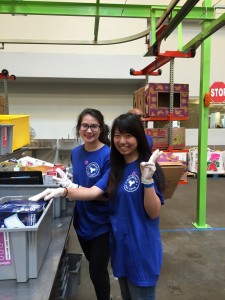
This weekend I joined the volunteer activity at the Houston Food Bank. I was surprised that there were many parents taking their young children to participate in the volunteer work. This rarely happens in Japan. I started my first volunteer work when I was 13 years old. My mother took me to the Nagoya International Center. I didn’t know much about volunteering then, but I really enjoyed the time I spent and what I did. Those good memories kept me doing volunteer work till now. I think is very important for parents to let their children to know there is this option. You can participate in volunteer work if you want.
Research Project Update
This week we ran CDI system at different pH and took samples each 3 minutes. We took sample from ph3, 5, 7, after that unfortunately our equipment didn’t work well. So we couldn’t take completely samples. We will continue this work next week. In the same time, we will put those samples to the ICP (Inductively Coupled Plasma) and IC (Ion Chromatography) to evaluate the efficiency of the current CDI.
I also went to the individual meeting with my mentor. My host lab professor is very busy; each group member only can meet her once in two weeks each time for 30 minutes. My mentor explained the current work he did to Professor Li. Professor Li has just come back from a conference. She showed the power point slides to us and gave some advice to my mentor. I was so lucky that Professor Li also sent me her slides by email. My mentor was very surprised about it. It is not common that professors will send their raw materials to a visiting student. Even though I don’t have the enough knowledge to understand everything in those slides, I still feel heartwarming. During my stay at Rice, I realized the importance of Chinese. I feel so lucky I can speak Chinese. When I meet some Chinese students and researchers here, they are always happy to share their stories with me and give advice to me. They are also very interested in my background. Everyone loves Japan in here. I was struggled with my identity a lot, but now I’m more confident about my individuality.
Week 04: Reflections on English Language & Life in the U.S.
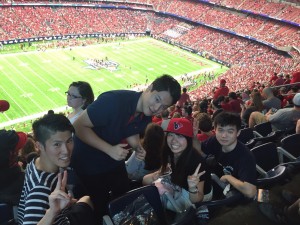
Daily life living in Houston is full of challengs. English is full of variety in here. Every day you can meet different people from different countries and who speak English with different accents. My mentor is from Korea. He is doing his research with other two students from a different lab. One of these students is from China and the other is from India. In my lab there are many Chinese researchers and exchange professors, they only use Chinese during lunch time. To be honest not everyone is a good English speaker. It will be much easier for them to communicate with each other in Chinese. The reason they choose to use English is because they want to make a better working environment for both Chinese speakers and other language speakers. In my office, there are 4 Chinese students and one Korean student who is my mentor. Once I asked him about how he feels working with Chinese students. He told me everyone is kind and he feels comfortable to work with them. Feeling comfortable is essential for working as a group. In Japan, Japanese students always only speak Japanese even though they are sitting in the same room with international students.
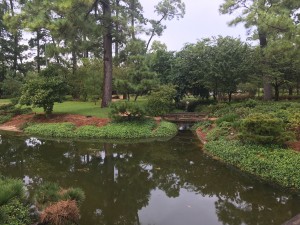
At first, I had some trouble to understand the Chinese students’ accent, but now I am getting used to it. I started to become familiar with their particular way of pronunciation. However, I still have some problem with Indian students. Most of time, I can catch what they said the first time. I learned many useful phrases to ask people to say things again. Once, I was doing my experiment alone in the laboratory. One Indian PhD student asked me about my experiment. After I explained my experiment and results to him, he asked me some suggestion. Unfortunately, I couldn’t understand them very well. I asked him to speak slowly and repeat it again. It was such a shame, I still couldn’t understand him. I should have asked him to write down the keywords at least. When I was in Japan, I thought asking people to repeat their words again could be rude. Now I understand I shouldn’t miss any change to gain new knowledge.
English in real life is very different from the English in the text book. In Japan, we always focus on grammar and vocabulary. Many people are afraid of speaking English. However we should know, English is just a tool for our communication, the most important thing is not English itself but how to use it well.
To be honest, during my stay in Houston, I didn’t feel my English skill was improving. I only use English in my laboratory, on the campus I use more Chinese, and after I go back to hotel I mainly use Japanese. But I saw one huge difference in my language skill. I’m not confusing with these three languages any more. Last winter I went to Poland for my internship. During that period I also have to use these three languages daily. I always getting confused with my situation. I always feel my brain stop running during the communication. But this time at Rice, I don’t have this problem anymore. This is the biggest improvement for me.
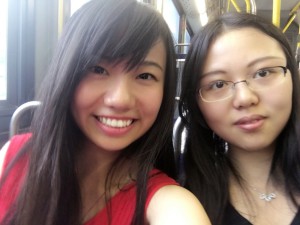
Research Project Update
Unfortunately, the equipment which I used for my experiment has not worked well since last Thursday. We waited the whole weakened, but it is still not working. My mentor told me that it will be impossible to finish this experiment. I and my mentor tried to move to another experiment, but we couldn’t find the equipment. I couldn’t do any more experiments the rest of the week. On Friday, we had a group meeting. Another exchange student from Beijing University made a presentation for her summer program. She is also an undergraduate student and same age with me. She has been here for 2 months. I was impressed with what she did while she was here. I hope I can also make a good presentation at the end of this program though I don’t have much time here. I started to worry about my experiment a little bit. My mentor tried to cheer me up. He showed me one paper which is connected to our project. We already finished almost all the experiment in this paper. But I was still a little upset about it. I hope everything will go well next week.
Week 05: Research in the U.S. vs. Research in Japan
Speaking from the personal aspect, one of the significant reasons for this summer internship is to learn about the studying environment for female researchers in the U.S. On this point, I believe my host lab is the best choice for me. In my home university in Japan, we don’t have any female professor in the engineering field. We only have few female PH.D students and they are basically international students. Take a look at undergraduate students in engineering department; the percentage of girls is always less than 10%. This is quite normal in all science and engineering departments in Japanese universities. I always feel lonely at my university. Before I came to America, applying for PH.D is not even a choice for me. I have to say, this short stay at Rice actually broadened my eyes. Thanks to Nakatani Foundation and Prof. Qilin Li, I was able to know the different world at Rice.
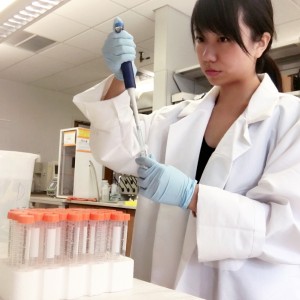
I met many female researchers at Rice from all around the world. After talking with them, I realized it is possible to reach one’s academic and personal goals at the same time. I don’t have to sacrifice something to choose science as my future path. In my host lab, the working hours are very flexible. No one requires you to stay at the office for the whole day. People only come to the office and laboratory when they think it is necessary. In Japan, there are many labs that have their own rules which requires their members to stay at the office for 8 hours per day. It doesn’t mean Japanese students work harder than American students. American students are good at using their time efficiently. For example, my mentor told me, he only sleeps 4 hours per day. After finishing all the classes and experiments, he has to go home straight and take care of his children. He has to find some summer internships to earn some money for his family. It doesn’t sound easy, but I believe he enjoys his life very much. In Japan and most Asian countries, marriage and confinement always can be an obstruction in female’s career path. In America and Europe, people are more open minded. It’s easier to take the balance of private and work time.
I was shocked at one of our group meetings. One of the female researchers brought her daughter to attend our meeting, because she couldn’t find anyone else to take care of her daughter. In Japan, it can be judged as an inappropriate decision. Her daughter is only four years old. She didn’t making any noise during our meeting. In my opinion, the biggest reason why everyone in my host lab is fine with this situation is we have a kind boss. Dr. Li is not only a successful scholar in the U.S. and also an affectionate mother. I remember, there was a time she asked me how did I practice ballet when I was a child. She gave her daughter’s old clothes to my mentor. Then I realized, it is a good choice for a girl to become a professor or researcher. The sensibility and kindness of female are needed in science field.
On the other hand, people are strict about the due date. It’s free for you to use your time in your way, but you have to make some results. I think this is the most difficult thing in people’s life. This is also the thing I want to learn during my student life.
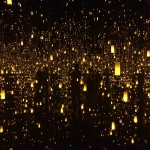
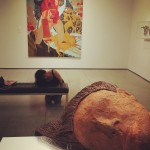
I went to the Museum of Fine Arts Houston this weekend. There is a special exhibition of a Japanese artist — Kusama Yayoi. The museum was opened at 10 at the morning. I arrive there at 10:30, but I only got the ticket at 4:15. I was very surprised she is so popular in America. I also went to the Houston Museum of Natural Science last weekend. There were many young parents who took their children there. I saw some adults taking selfies with dinosaur. The distance between general and science is closer in America than in Japan.
Research Project Update
During this week, I did analysis for all my experiments that I have done in 4 weeks. My mentor and I also did some new experiments. We changed our feed water to mixture water (NaCl and CaCl2). Based on the result which we got form our analysis, we take sample each one minutes. We used ICP to measure the concentration of each ion and evaluated the selectivity of our current system follow the time flow. Since I haven’t finished my experiments, it was very hard for me to submit my poster.
Question of the Week
I try not to eat junk food as much as I can, but I feel I start to put on some weight recently. I saw many American students eat way much than me, how can they stay slim?
- Eating out in the U.S. is comparatively more expensive than in Japan and the low-cost, fast-food options can be very unhealthy. Eating out is usually something that most Americans do only a few times a week and is usually seen as a ‘treat’ or a way to meet up and socialize with your friends. If you want to eat healthy at a restaurant you could look for items in salad or sandwich section ask if they have any vegetarian meals. To save money and maintain good health, you should also be prepared to cook some lunches and dinners on your own. This way, you can control the portion size, how the items are prepared, and bring left-overs with you to Rice to eat for lunch. You probably saw that most of the graduate students in your lab brought their lunch with them each day as this is a way to save money and also eat more healthy food. Finding some good Asian restaurants also is helpful as they usually have more vegetable or healthy options; unfortunately though most of the best Asian restaurants in Houston are in Chinatown which you need to take an Uber to get to. For more on this, including links to information on Asian grocery stores and restaurants in the U.S., see the Food in the U.S. resources page of our website. Also, many people in the U.S. regularly go to the gym or ‘work-out’ in some way. That way they can continue to eat poorly but through exercise maintain their preferred weight. At Rice University there is a very nice on-campus gym that all students, including visiting research students, have access to for free.
Week 06: Final Week at Rice & Research Poster Presentation
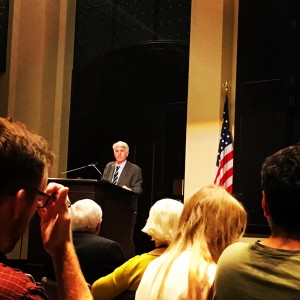
I can’t believe 6 weeks have been passed since I arrived in Houston. Every morning when I open my eyes I always think how lucky I am to be a member of the 2016 Nakatni RIES Japanese Fellows. This is the first time I visited America. Studying in the U.S. used to be my dream when I was a high school student. I had to give up my dream because of some private reasons. I was dreaming of studying economy at Columbia University or Chicago University when I was 17. 4 years passed. Today, I’m actually doing my research at Rice and will also got a chance to visit Columbia University next week. I have to thank the Nakatani Foundation, my host professor at Rice and all the people related to this program. My dream which I gave up before, now it’s restarting again.
To be honest, I wasn’t a big fan of science. I had some interests in the science field. I like the sophisticated process and how people solve problems in a scientific way. I do believe I can find a very good job after graduating from the engineering department. But I was not sure if I actually did like what I am studying right now or not. Classes in Japanese universities usually are not fun at all; you are just taking notes. There is rarely conversation between professors and students. The education style in America is totally different. In my host lab, there are no rules for working hours. Students come to the lab when they think it is necessary. Undergraduates are able to join a lab from their first year. In Japan I used to think, I can’t join a lab without enough knowledge. However, doing research in the U.S. let me understand that I can learn and practice at the same time. When my mentor tries to explain the mechanism of the experiment we did, I always have to learn many new theories or laws to understand him. It wasn’t easy but I really enjoyed learning new things in this way. I also got a chance to make my plan in for the rest of undergraduate study. I started to think what kind of class I should take or retake in the next semester. I want to study more about my major not only because I have to but also I start to love what I am studying right now.
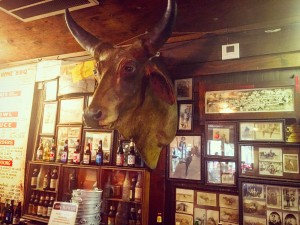
In my last week, my mentor and other PH.D. students took me to a restaurant to eat Texas BBQ. They told me there were many places they wanted to take me if I come back in the future. They also gave me many advice about applying to Rice. During this summer internship I also made connections with many visiting researchers and professors from China. This program changed my life a lot. I wish someday I can become a Professor and give a chance to students like me to see a different world. To let them know, there is nothing impossible, you always can change your life if you work hard enough.
I did my final poster presentation on Friday. I’m so happy because my professor and mentor came to the RCQM colloquium. Another Post Doc from Ajayan’s lab also came for my presentation. They helped me a lot during this summer. It’s so sad to say goodbye to them. Dr. Li told me, she will always support me to reach my academic goals in the future. I can’t tell how much I was impressed when I heard it. I’m so blessed to meet a professor like her.
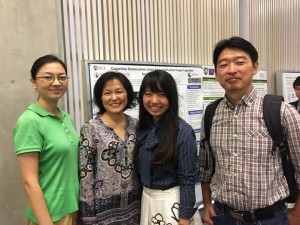
Pei Dong (Ajayan’s group), Dr.Li Qilin, Jun Kim. ~ Yunong Wang
Final Research Project Poster: “Capacitive Deionization Using Activated Carbon Super Capacitor for Water Desalination”
Host Lab: Prof. Qilin Li Lab, Civil & Environmental Engineering, Rice University
Research Mentor: Dr. Jun Kim (Post-doc)
My fundamental goal for this research internship is to understand the basic mechanism of Capacitive Deionization (CDI) system. As we known lack of fresh and safe water has become a critical global issue for many years. In order to increase the fresh water supply, CDI technology has been identified as a promising energy-efficient desalination technology removing salts from aqueous solutions. I set up three types of experiment to study more about this system form different aspects. Firstly, we did contact angle measurement and cyclic voltammetry experiment (using two electrodes conformation) for characterization of the electrode. From those experiment we can tell, electrodes made of powder activated carbon are hydrophobic and have same capacity. Secondly, we did electrosorption test during our desalination cycle in different condition (using NaCl solution as feed water tested in different pH and mixture of NaCl and CaCl2 as feed water running CDI system only in pH7). When we applied a constant voltage 1.2V to the CDI system, the current used for electrosorption was within 0.005 A range which means the CDI system needs only few energies. More salt was removed on mono (Na only) solution was used as feed water. Finally, using ICP-OES for the quantification of ions. Selected one cycle from both desalination experiment running in pH7 using either NaCl solution or mixture of NaCl and CaCl2 solution as the feed water. By learning how many ions were actually removed during the desalination period, we found the absorption of Na+ ions is following the electrosorption / regeneration cycles. Electrosorption / regeneration cycle for mixture feed water costs more time than NaCl solution. Na+ and Ca2+ ions are not distinctively reduced much during the adsorption period. As the future work we have to look more for the selectivity for the current CDI system. We have to modify our experiment methods and found more effective materials for the electrodes.
Week 07: Visit to Washington, DC & New York City
I can’t believe the program is reaching the end. During the last week we traveled to Washington, DC and New York City. Since this was my first time visiting the U.S., I’m really looking forward to our trip; as we know DC and NYC are both cities very representative of the U.S. We spent 4 days each in DC and NYC.
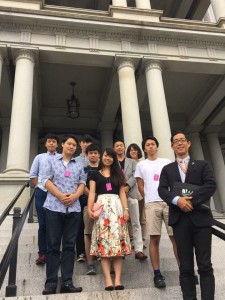
We used a domestic airline to travel from Houston to DC. It was the tinniest airplane that I’ve ever taken. It only has 3 seats for each line, but it was full of people. It was also my first experience of crossing the time zones in one country. In DC we were so lucky to be able to enter the White House and talk with Mr. Kei Koizumi of the White House Office of Science & Technology Policy (OSTP). Mr. Koizumi is working as an assistant director at OSTP in Research and Development. I was very surprised to found Mr. Koizumi is a 2nd generation Japanese American. It was very hard for me to imagine this before I met him. During those days we are traveling in the U.S. the headlines of Japanese media was all about Ms. Renho. I also saw her name from the New York Times website. She has just become Japan’s main opposition party first female leader. There are many people and mass media questioning her Taiwanese heritage. During my short stay at White House, beside Mr. Koizumi I also saw many people with Asian features. Due to the globalization the number of mixed-race citizens and immigrants that is remarkably increasing around world these days. Attitudes toward mixed-race citizens have recently been changing in the world. I don’t think there is a right answer to this situation, because it is a very complicated and dedicated problem. As a 2nd generation immigrant in Japan, I had a very difficult time to build my identity when I was a teenager. Meeting with Mr. Koizumi brings me so much hope and confidence. After pursuing PH.D degree in America, I wish I can come back to Japan and reaching my life goals.
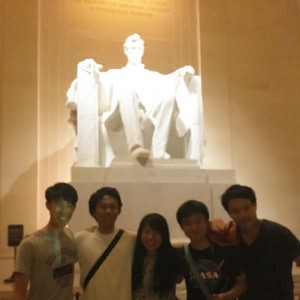
I also enjoyed sightseeing with the other Japanese Fellows. We saw many monuments and visited many museums in DC. The most impressive place at DC was the WWII Memorial. I found Okinawa at the edge of a fountain. Around the WWII memorial there were people from all over the world enjoying their vacation in the U.S. It’s so hard to imagine people were fighting with each other just few decades ago.
At night, some other Japanese Fellows and I decided to ride a bike from our hotel to the Lincoln Memorial. We are told that the light up will be end at 10:00 PM. We rode very fast to meet the time. It was much further and harder than I expected. In the end, we reached the Memorial on time, but we realized the light up was still on after 10:00 PM. It’s not punctual at all! DC at night was full of magic and the Lincoln statue looked totally different from day and night; it felt scared and holy. On our way home, we were riding bikes while singing songs and enjoyed the beautiful night view of DC.
After saying goodbye to DC, we started our trip in NYC. After the hotel check-in, we went to Chinatown to have lunch with Ogawa-san. During my stay in Houston, it was very hard to find some good Asian food. (Tip: There is a Chinatown in Houston too that has very authentic Asian food and some Asian grocery stores. You do need to take a car or Uber though as it is not close to Rice University Campus). Thanks to Professor Shimizu I had a chance to eat some Japanese foods, but it was very hard for me to cook by myself. The lunch we had at China town tasted much better than I expected. Good food always can bring people much energy and happiness. In the afternoon, we went to Wall Street, Battery Park and the 9/11 Memorial. Seeing the Statue of Liberty from Battery Park made it look much tinier than we thought. I was very impressed by the design of 9/11 memorials. The World Trade Center was destroyed by the terrorism. The Memorial features two enormous waterfalls and reflecting pools, each about an acre in size, set within the footprints of the original Twin Towers. It remains us how terrifying the accident was.
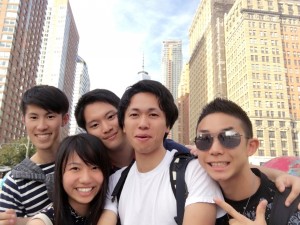
My best memory in NYC was watching Lion King at the Broadway Theater with the other Japanese fellows. Lion King is one of my favorite musicals. Watchinga musical in America is much different from in Japan. Audiences are very diverse and participated more in America. We can enjoy the musical in a relaxed mode. The lighting and acoustic devices they used were a very high technology method. Every scene was so breathtaking.
Happy times always won’t last forever. After a long flight we are back to Tokyo. I was so tired after the long trip. 2016, I had a wonderful summer in America. I met 7 friends who share similar dreams with me. We worked very hard together and played very hard at the end of this program. When I saw the landscape of Tokyo from the airport, it was so sad to know the end was coming. Everyone did a great presentation at the end. Senior students are always my adoration. I wish I can become more sophisticated and kind just like them.
Final Report: Reflections on the Nakatani RIES Fellowship
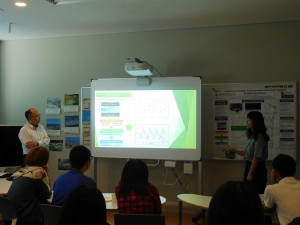
Before the Nakatani RIES program, I was living with nothing in my mind in ordinary days. I was afraid of time passing by so quickly, but I couldn’t find something I could really be really enthusiastic about. Just like other colleges students, I took lectures like a task, hung out with a branch of good friends, did well at my part time job and traveled around the world during my vacations. Everything looks fine. But I knew, I was not fine with it. I was thinking about what I could do to make my life different. At the perfect time, I got an email from my university about the Nakatani RIES Fellowship program. It was a miraculous encounter for me.
During this program, I was able to talk with many people who I wouldn’t be able to meet in my usual life such as Professor Neal Lane, former director of the U.S. National Science Foundation, and Mr. Kei Koizumi from the White House Office of Science & Technology Policy and other speakers. I got a lot of inspiration from the optional talks during this program. Nowadays, we can find any information through the internet. It is true Google can tell us anything. On the other hand, those true voices turn out to be more precious for us.
Besides those speakers, spending time with other 7 Japanese fellows was also a valuable experience for me. Even though we are from different places in Japan and have different educational backgrounds, we share similar dreams. I believe we built a strong relationship during this summer.
We only have four years studying at our university. You can choose to spend your time like everyone else, but you also have the ability to make it special. I took 3 years to find out what I really what to do in the future. I believe this internship was a turning point of my school life. When I was 17, my dream was studying at Columbia University and working for the United Nations after graduate. The failure of the entrance exam once brought down all my confidence and hope. But I’ve totally overcome this now. Who knew that 4 years later I would visit Columbia University and talk to professors about my interests in science? Thanks to Nakatani program I could find my way again. Now I know, I don’t necessarily to work for the United Nation. I can be a partner of the UN as a scientist. The most important thing I realized during this summer is the field which I’m studying right now is straightly related to energy and environmental problems. Carbon materials or other new materials can be a solution for those problems.
As for my advice for the future participants in the Nakatani RIES Fellowship for Japanese students, I would say be prepared before you start your internship in America. Many students had some troubles with their mentors, but I believe most of those problems can be solved by communication. After my host lab was determined, I sent an e-mail to my host professor immediately. I explained my interest in her research area, and what I expected to learn during this internship. My host professor was so nice to give me some options of potential projects based on my e-mail. After chosing my project, I asked her to let me sent an e-mail to my mentor. She gave me two Ph.D. students e-mail address. After contacting these two students, I was able to choose my mentor by myself before I arrived America. It was very important to know your mentor’s project. You will spend much more time with your mentor than your host professor. A good relationship will make your stay more meaningful.
At the end, I have to thank to the Nakatani Foundation to make such a great exchange program. Letting me, such a normal girl, become a member of the Nakatani RIES Japanese Fellows. Thanks to Professor Kono for providing us so many opportunities to know more about the research life in America. Aki-san, Sarah and Kato-san were always so patient and kind to support us every time. I also have to thank to my family for supporting me all the time.

